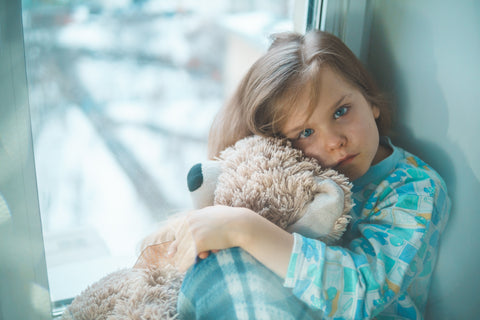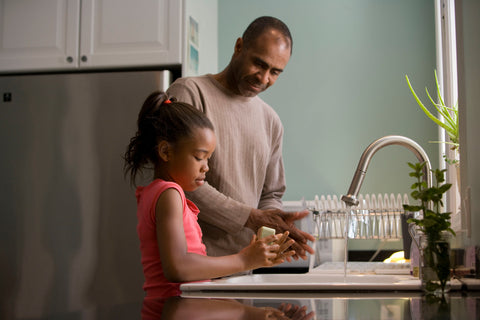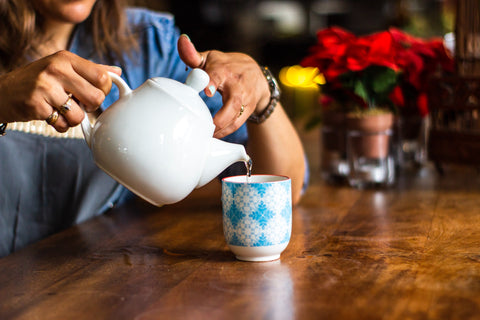Understanding RSV And What Are The Best Natural Treatments For It?
You’ve got the dreaded RSV lurgie and you’re having trouble shifting it… you’re not the only one! Australia is having bit of an RSV outbreak right now and most of us have never even heard of it. So let’s start there…
What is RSV?
Respiratory Syncytial Virus (RSV) is a common viral infection that affects the respiratory system. It is particularly severe in infants, elderly individuals, and those with weakened immune systems. RSV is responsible for causing mild to severe respiratory illnesses, ranging from common cold-like symptoms to severe pneumonia as Respiratory Syncytial Virus primarily affects the lungs and respiratory passages. RSV is a highly contagious virus (I know, bummer huh!)
In this blog, we will delve into the details of RSV, including its transmission, symptoms, prevention, and treatment.

Transmission:
RSV spreads through respiratory droplets when an infected person coughs or sneezes. It can also be transmitted by touching contaminated surfaces and then touching the face or mouth. RSV can survive on surfaces for several hours, making it easy for the virus to spread in crowded places like day care centres and schools.
Symptoms:
The symptoms of RSV can range from mild to severe, depending on the individual's age and overall health. In infants and young children, the following symptoms may occur:
- Runny or stuffy nose
- Coughing
- Sneezing
- Fever
- Decreased appetite
- Irritability or restlessness
- Rapid or difficult breathing
- Wheezing
In older children and adults, RSV usually causes mild, cold-like symptoms. However, it can lead to more severe respiratory infections, such as bronchiolitis or pneumonia, in individuals with weakened immune systems or underlying health conditions.
Prevention:
Preventing the spread of RSV is crucial, especially in high-risk populations. Here are some preventive measures:
- Hand hygiene: Regularly washing hands with soap and water for at least 20 seconds can help eliminate the virus from the hands.
- Avoid close contact: Limiting close contact with individuals who are sick or displaying symptoms of respiratory illness can reduce the chances of transmission.
- Clean and disinfect: Frequently disinfecting commonly touched surfaces, such as doorknobs, toys, and electronics, can help prevent the spread of the virus.
- Cover coughs and sneezes: Encourage individuals to cover their mouth and nose with a tissue or their elbow when coughing or sneezing.

Treatment:
Rest and hydration: Getting adequate rest and drinking plenty of fluids can help the body fight off the infection.
There are several homeopathic remedies which will assist and support the body, such as Oscillococcinum that is good to have on hand during cold and flu season. It is most effective if dosed at the onset of symptoms when there is just a tickle in the back of the throat. However, I have seen children have a dramatic improvement within the hour of dosing Oscillococcinum, even when used on the second, third or fourth day of symptoms.
Other homeopathic remedies to consider for RSV include Bryonia (dry cough), Antimonium Tart (wet cough), Kali Birchromium (thick ropey mucous), Pulsatilla (thick yellow mucous and when the child needs a lot of reassurance), Belladonna (high fever) and Rhus Tox for fever with body aches.
I prefer not to use a cough mixture in the daytime particularly, as the cough is an important mechanism serves to clear the airways of mucous. Use it at night, if it interferes with sleep or the person is exhausted from coughing.
Keeping airways clear and hydrated is an important part of RSV management, especially for small babies. Because babies can’t clear mucous from their nostrils, manually removing mucous is necessary. I have used a nasal aspirator for babies, which is a bulb like device that is squeezed while the tube is gently placed in the nostrils.
Steam inhalation is a common treatment for RSV and other respiratory infections because it soothes and hydrates the respiratory tissues. Either use the hot water in a bowl with a towel over the head, (taking great care not to spill), or use a steamy bathroom.
Breathing treatments: In severe cases, healthcare professionals may administer breathing treatments, such as nebulized medications or oxygen therapy.
It is important to consult a healthcare professional for a proper diagnosis and guidance on managing RSV, especially in young children or individuals with underlying health conditions. Seek emergency care if a person has a high fever, difficulty breathing, and bluish colour to their lips, skin or nail beds.

In short, Respiratory Syncytial Virus (RSV) is a common viral infection that affects the respiratory system, particularly in infants, young children, and older adults. While RSV usually causes mild respiratory symptoms, it can lead to severe illnesses in vulnerable populations. By practicing good hygiene, taking preventive measures, and seeking medical attention when necessary, we can reduce the transmission of RSV and help protect those at risk.
If you would like to talk about or order the homeopathic remedies mentioned in this blog, you can buy them HERE, call 07 5455 3224 or email ruby@rubytickner.com.au.
Leave a comment